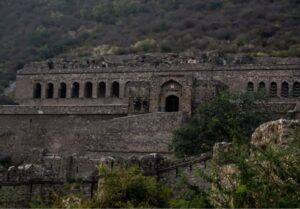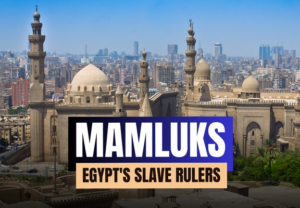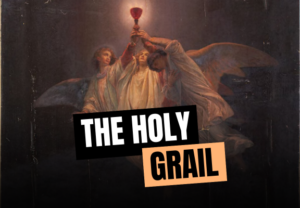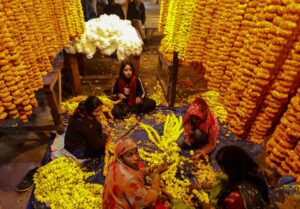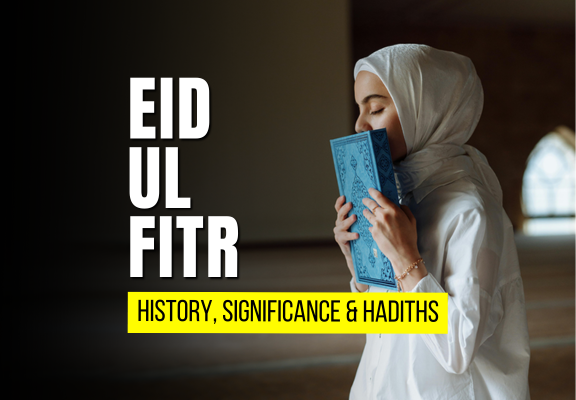
Muslims around the world celebrate Eid-ul-Fitr, the Festival of Breaking the Fast, as a joyous occasion at the end of Ramadan, the holy month of fasting. Beyond its festive allure, Eid-ul-Fitr carries deep historical significance, steeped in rich traditions and religious teachings. In this blog, we delve into the history, important facts, and lesser-known Hadiths (sayings of Prophet Muhammad) surrounding Eid-ul-Fitr, shedding light on its spiritual essence and cultural significance.
Eid-ul-Fitr: Historical Origins
The Prophet Muhammad (peace be upon him) lived in 7th-century Arabia during the historical origins of Eid-ul-Fitr. Eid-ul-Fitr, also known as the “Festival of Breaking the Fast,” signifies the conclusion of Ramadan, the global Muslim holy month of fasting.
Islamic tradition states that Medina celebrated the first Eid-ul-Fitr in 624 CE, following the Prophet Muhammad’s migration from Mecca. The Prophet reportedly received revelations from Allah (God) instructing Muslims to observe fasting during the month of Ramadan. The Prophet commanded Muslims to celebrate the completion of the month-long fast with prayers, feasting, and acts of charity.
Eid-ul-Fitr holds historical significance as it commemorates the spiritual journey Muslims embarked on during Ramadan. It symbolizes the culmination of a period of self-discipline, devotion, and purification, as well as gratitude for the blessings bestowed by Allah.
Eid-ul-Fitr also carries cultural and social significance, serving as a time for Muslims to come together with family, friends, and the community to celebrate the joyous occasion. The celebrations typically include special prayers at mosques or open prayer grounds, the exchange of greetings and gifts, and the sharing of festive meals.
Overall, Eid-ul-Fitr’s historical origins reflect the profound religious significance and communal spirit associated with the celebration, making it one of the most cherished and anticipated events on the Islamic calendar.
Significance of Eid-ul-Fitr
Eid-ul-Fitr holds profound significance in the Islamic faith and serves as the joyous culmination of Ramadan’s month-long fasting period. Its significance can be understood in a variety of ways.
Spiritual Renewal
Eid-ul-Fitr marks the completion of Ramadan, a month of fasting, prayer, and spiritual reflection. It symbolizes the fulfillment of one’s religious duties and the opportunity for spiritual renewal and growth.
Gratitude and Thankfulness
Muslims observe Eid-ul-Fitr as a day of gratitude and thankfulness to Allah for allowing them to complete the fast and for bestowing blessings upon them throughout Ramadan. It is a time to express appreciation for the opportunity to strengthen one’s faith and devotion.
Community and Unity
Eid-ul-Fitr fosters a sense of unity and community among Muslims worldwide. It is a time when families, friends, and communities come together to celebrate the occasion through prayers, feasting, and acts of charity. The shared experience of fasting and celebration strengthens bonds of brotherhood and sisterhood.
Generosity and Charity
Giving to those in need is an integral part of Eid-ul-Fitr. Muslims are encouraged to give Zakat-ul-Fitr, a form of charity given before the Eid prayer, to ensure that everyone can partake in the festivities and experience joy on this auspicious day. It emphasizes the importance of compassion, empathy, and caring for the less fortunate members of society.
Renewal of Social Bonds
Eid-ul-Fitr is a time for reconciliation and forgiveness. Muslims seek to mend relationships, reconcile differences, and forgive past grievances, thereby fostering harmony and goodwill within families and communities.
Cultural Celebration
Eid-ul-Fitr is more than just a religious holiday. It is also a cultural celebration that looks different in each community and area. It is characterized by vibrant festivities, including special prayers, colorful decorations, traditional attire, delicious food, and the exchange of gifts and greetings.
In essence, Eid-ul-Fitr is a multifaceted celebration that embodies the values of faith, gratitude, unity, generosity, and compassion. It serves as a reminder of the importance of spirituality, community, and social responsibility in the lives of Muslims, reinforcing their commitment to living virtuously and in accordance with Islamic principles.

Prayers and festivities for Eid
Eid prayers and festivities are integral components of Eid-ul-Fitr celebrations, marking the culmination of Ramadan and the beginning of Shawwal, the tenth month of the Islamic lunar calendar. Here’s a closer look at Eid prayers and the joyous festivities that follow:
Eid Prayers (Salat-ul-Eid)
- Large congregations at mosques, open prayer grounds, or designated public spaces typically perform Eid prayers early in the morning, shortly after sunrise.
- The imam delivers a sermon (khutbah), focusing on themes of gratitude, piety, and community unity, before the Eid prayer, which consists of two units (rakats).
- The prayer itself consists of takbirs (declarations of Allah’s greatness) and supplications, with worshippers standing, bowing, and prostrating in unison as they offer their prayers to Allah.
Festive Attire
- Muslims dress in their finest attire for Eid prayers, often wearing new clothes or traditional garments specific to their culture and region. This symbolizes the importance of the occasion and the joyous nature of the celebration.
Greetings and Embraces
- Following Eid prayers, Muslims exchange heartfelt greetings of “Eid Mubarak” or “Blessed Eid” with one another, accompanied by warm embraces and well-wishes for happiness, prosperity, and peace.
- It is customary to visit family members, friends, and neighbors to extend greetings and share the joy of Eid.
Charitable Giving (Zakat-ul-Fitr)
- Before attending Eid prayers, Muslims are required to give Zakat-ul-Fitr, a form of charity aimed at purifying their wealth and ensuring that the less fortunate members of society can also partake in the festivities.
- Zakat-ul-Fitr typically consists of staple food items, such as grains, dates, or money equivalent to the cost of these provisions, which are distributed to those in need before Eid prayers.
Family gatherings and feasting
- Eid-ul-Fitr is a time for family reunions and gatherings, with loved ones coming together to share festive meals and enjoy each other’s company.
- Elaborate feasts are prepared, featuring traditional dishes and delicacies specific to the culture and cuisine of the region. It is a time of indulgence and culinary delights.
Acts of charity and kindness
- In addition to Zakat-ul-Fitr, Muslims are encouraged to engage in acts of charity, kindness, and goodwill throughout the day, reaching out to those in need and spreading happiness and generosity in their communities.
Eid prayers and festivities epitomize the spirit of unity, gratitude, and celebration that defines Eid-ul-Fitr, serving as a joyful expression of faith and community solidarity.
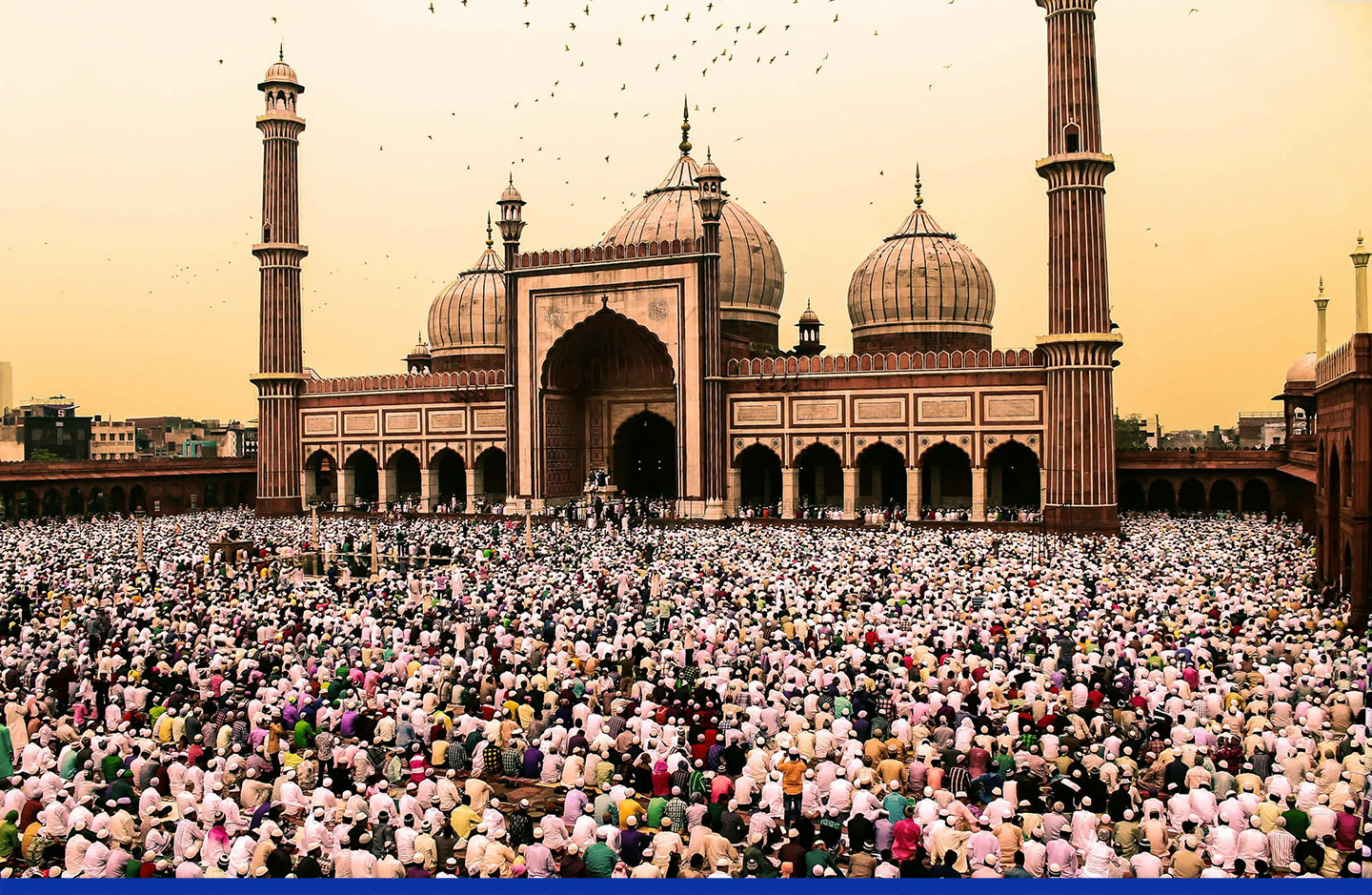
Traditions and Customs
Eid-ul-Fitr, the joyous festival of breaking the fast, is distinguished by a tapestry of cherished customs and traditions embraced by Muslims globally. Among these, the custom of donning new attire holds significant importance. Families dress in their finest, often purchasing new garments specifically for Eid, symbolizing purity, renewal, and the festive spirit. Alongside new clothes, the application of fragrant perfume is customary, enhancing the sense of joy and celebration.
Furthermore, the exchange of sweets and gifts among loved ones marks Eid-ul-Fitr, exemplifying generosity and fostering bonds of affection and goodwill. These gestures of kindness and sharing reflect the essence of Eid-ul-Fitr as a time of abundance and community spirit. Additionally, the tradition of partaking in communal feasts, known as Eid-ul-Fitr or Sadaqat-ul-Fitr, brings families and communities together in joyous celebration. These feasts are characterized by lavish spreads of delectable dishes and traditional delicacies, offering a shared experience of culinary delight and camaraderie. Through these customs and traditions, Muslims around the world unite in commemorating the blessings of Eid-ul-Fitr, spreading joy, love, and harmony within their communities.
Unknown Hadiths about Eid-ul-Fitr
While there are numerous hadiths related to Eid-ul-Fitr, it’s important to note that they are not directly tied to specific verses of the Quran. Hadiths are the recorded sayings and actions of Prophet Muhammad, and they provide guidance and insights into Islamic practices. Here are some lesser-known hadiths about Eid-ul-Fitr:
The Virtue of Eid-ul-Fitr
This is what Prophet Muhammad (peace be upon him) said: “Anyone who breaks their fast by giving someone food will get the same reward as the person who fasted, without taking away from their reward in the slightest.” (Tirmidhi)
The Importance of Takbir
Abdullah ibn Umar reported: The Messenger of Allah, peace and blessings be upon him, used to say the following Takbir (declaration of Allah’s greatness) on the days of Tashriq (the three days following Eid-ul-Adha and Eid-ul-Fitr): “Allahu Akbar, Allahu Akbar, la ilaha illa Allah, Allahu Akbar, Allahu Akbar, wa lillahi al-hamd.” (Sahih Muslim)
The Prohibition of Fasting on Eid-ul-Fitr
Abu Sa’id al-Khudri reported: The Messenger of Allah, peace and blessings be upon him, prohibited fasting on the days of Eid-ul-Fitr and Eid-ul-Adha. (Sahih Muslim)
The Timing of Giving Zakat-ul-Fitr
According to Ibn Umar, the Messenger of Allah, peace and blessings be upon him, commanded every Muslim, slave or free, male or female, young or old, to pay one Sa’ of dates or one Sa’ of barley as Zakat-ul-Fitr before they went out to offer the Eid prayer. (Sahih Bukhari)
These hadiths offer valuable insights into the practices and teachings associated with Eid-ul-Fitr, emphasizing the importance of charity, Takbir, abstaining from fasting on Eid day, and the timing of giving Zakat-ul-Fitr. May we strive to adhere to these teachings and embody the spirit of Eid-ul-Fitr in our lives.
Conclusion
Eid-ul-Fitr stands as a testament to the enduring faith and resilience of the Muslim community, uniting believers in a spirit of joy, gratitude, and compassion. As we celebrate this auspicious occasion, let us reflect on its profound teachings and strive to embody the values of generosity, empathy, and solidarity exemplified by Prophet Muhammad. May Eid-ul-Fitr inspire us to deepen our spiritual connection with Allah and foster bonds of love and harmony with our fellow beings, transcending the boundaries of culture and creed.

